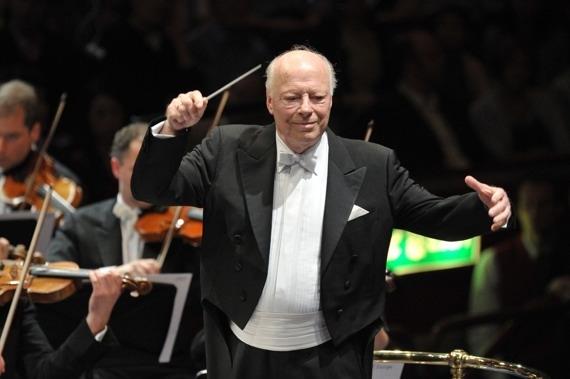Brahms, Brahms, Brahms, Brahms, Brahms, and one work dedicated to Brahms by Schumann. That's right: it was Brahms night at the Proms. No scary new works. No discombobulating new interpretative glosses - dear old Bernard was our guide. Nothing to ruffle the feathers or impede the thirsty ways of the professional champagne-quaffers in the sponsor boxes. Nothing to fear or disturb that is, except for around a dozen LEDed vulvas garlanding the stage.
At least I think they were vulvas. They might have been roses. My female friend thought vulvas, too. Anyway, what strange visual imagery. The performance that unfolded had very little to do with vulvas and a lot to do with the sweet and tender thoughts of old age. Haitink's rendition of the Third Symphony may have begun with a splendid opening fanfare in grand mode but it seemed that the music wanted nothing more than to hide, to withdraw into those many quiet, shadowy nooks and crannies of respite. Here Haitink and the Chamber Orchestra of Europe provided the most touching contributions: a soft little rustic jig, a lovingly tended-to old melody, a delicate wind concertino.
Though the slow speeds of the Andante meant for a slightly saggy middle, the pacing otherwise was pretty impeccable, especially in understanding structure. Haitink's sensitive touch to the third movement allowed a brief Mozartian air to fill the hall. And a clear and sturdy path (aided by a solid conducting style) directed us through to the nostalgic uplands of the finale's final bars.
The usually rather brilliant Emanuel Ax seeming to bring rather less to his performance of the Brahms Piano Concerto in D minor. The speeds were ponderous - good for a run through, not inspiring for a live performance. And, though there came a gear shift in the run up to the recapitulation and the slow movement began to reveal some sun as Ax was left to his own musical devices, neither conductor nor pianist seemed to have the muscle or syncing to make the stormier passages work. The Rondo subsequently suffered from this unwillingness by either to take the work by the scruff of the neck.
The late-night prom continued the Brahms theme. Angela Hewitt delivered two beautifully paced, darkly shaded Brahms Intermezzi, Op 117, Nos 1 and 2. A Gothic interloper, Schumann's Introduction and Concert Allegro, Op 134, saw conductor Andrew Manze and Hewitt forced to take on strange new postures. Tall and bony Manze approached the BBC Scottish Symphony Orchestra crooked and Munch-like as if a man raised from the dead. Meanwhile, Hewitt, giving some much-needed welly to her part, especially in a wild cadenza, indulged in a strange windmilling piano-side manner.
What had been lacking almost completely from the evening was real visceral excitement. But we finally got it with Manze's gripping account of Schoenberg's whacky arrangement of Brahms's Piano Quartet (complete with a Carnival of the Animals part for xylophone). There was a Lisztian grandeur and headiness to Manze's evocation of the patchwork quilt of gypsy tunes and rhythms. He shaped the BBCSSO very stylishly and they responded in kind with some impressive contributions, especially from the clarinet of Yann Ghiro.
It might have been the highlight were it not for Ax's encore of Schumann's first Fantasiestücke, Des Abends, in the first Prom. Ax's impeccable musicianship would finally get a proper hearing. No one wanted to miss it, least of all Haitink, who stood in the wings on tip toe, his face at first eager, then turning to reverie, his body almost beginning a little dance.














Comments
Add comment